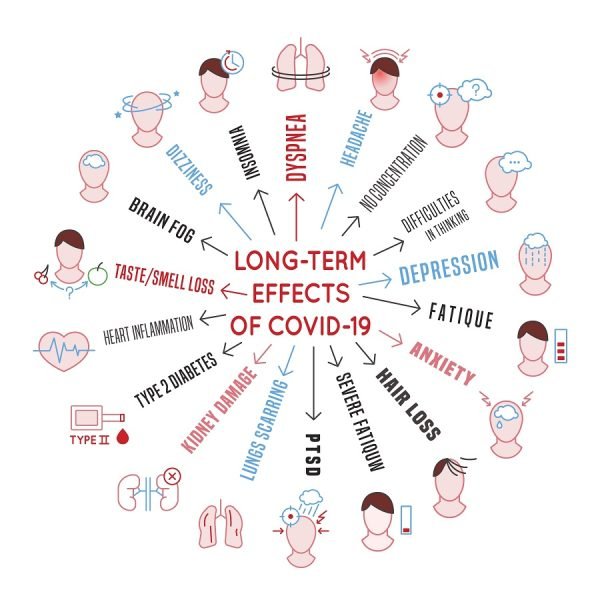
As a Psychiatric Nurse-Practitioner, I have seen the impact that the COVID-19 pandemic has had on the mental health of many of my patients and the effect it’s had on my loved ones & friends. Long-COVID, or the ongoing symptoms experienced by some individuals who have contracted the virus, has magnified the stress and uncertainty of an already challenging time.
The physical symptoms of Long-COVID, such as fatigue, brain fog, and difficulty breathing, can be incredibly debilitating. However, I have seen the emotional toll of this condition most commonly in my patients. Many struggle with anxiety, depression, and hopelessness as they try to navigate a new normal with ongoing symptoms and a lack of answers.
The uncertainty surrounding Long-COVID can be challenging for those struggling with mental health, and not knowing when or if their symptoms resolve can leave us feeling helpless and overwhelmed. In addition, this can lead to feelings of isolation, as those affected may struggle to connect with others who do not understand what they are going through.
The impact of Long-COVID on mental health extends beyond those who have contracted the virus. The stress and anxiety of the pandemic and the financial, social, and familial disruptions that have come along with it have affected us all. I have seen more patients struggling with anxiety, depression, and other mental health conditions due to these broader societal changes.

It is important to remember that seeking help for mental health concerns is a sign of strength. It can be tempting to try and push through difficult emotions, but ignoring the impact that Long-COVID and the pandemic are having on our mental health will likely lead to further distress. Many resources are available to those who need support, including medication, therapy, and support groups.
If you are experiencing symptoms of Long-COVID and struggling with your mental health, reaching out to your healthcare provider for support is essential. They can help to address any physical symptoms and provide referrals to mental health professionals as needed.
For others who are not experiencing symptoms of Long-COVID but are still feeling the impact of the pandemic on their mental health, it is vital to take care of yourself. This may mean seeking support from a mental health professional, practicing self-care, and reaching out to friends and family for support.
In conclusion, the impacts of Long-COVID on mental health cannot be ignored. We need to acknowledge and address the emotional toll of this condition and the pandemic’s broader impact on individuals and communities. By seeking support and caring for our mental health, we can ensure that we are better equipped to navigate these challenging times.
Here are some self-care approaches for addressing Long-COVID:
- Exercise: Regular physical activity can help improve mood and reduce symptoms of anxiety and depression.
- Mindfulness and meditation: Engaging in mindfulness and meditation practices can help individuals feel more relaxed, centered, and in control of their thoughts and emotions.
- Connecting with others: Maintaining social connections, even remotely, can help individuals feel supported and less isolated.
- Restorative sleep: Sleep is essential for physical and emotional well-being. Establishing a consistent sleep schedule can help improve sleep quality and reduce stress.
- Engaging in hobbies: Engaging in activities that bring joy and a sense of accomplishment can help improve mood and reduce stress.
- Healthy eating: Maintaining a healthy diet can help improve overall physical and emotional well-being.
- Seeking support from community resources: Local resources may be available, such as support groups or community organizations, that can provide additional support and assistance.
Remember, your mental health is just as important as your physical health. With the proper support and resources, it is possible to manage the impact of Long-COVID and find a path to feeling yourself again.
Let me know if I can help.